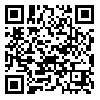Volume 11, Issue 39 (6-2004)
RJMS 2004, 11(39): 165-171 |
Back to browse issues page
Download citation:
BibTeX | RIS | EndNote | Medlars | ProCite | Reference Manager | RefWorks
Send citation to:



BibTeX | RIS | EndNote | Medlars | ProCite | Reference Manager | RefWorks
Send citation to:
Hooshiar E, Mohammad Hassan Z, Salek Moghadam A, Shaker Z, Ebtekar M. Study of the Effects of Chemical Warfare(Mostly Sulfur Mustard) on Neutrophils in Chemical Injuries Ten Years After Exposed War. RJMS 2004; 11 (39) :165-171
URL: http://rjms.iums.ac.ir/article-1-130-en.html
URL: http://rjms.iums.ac.ir/article-1-130-en.html
Abstract: (10056 Views)
The incidence of recurrent infections in chemical injuries made us guess that phagocytic system of these patients has been disordered. On the other hand, deficiency of phagocytic function in scalds has been proved and superficial burns seen in these subjects also encouraged us to study the condition of their neutrophils. Neutrophils are one of the main members of natural immunity and have an important role in host’s defense especially against bacterial infections. In this study, 75 chemical weapon victims of the war between Iran and Iraq were divided into three groups of 25 depending on the severity of the complications(mild, moderate and severe). In addition, 10 subjects who were not exposed to sulfur mustard were considered as the control group. 5ml of peripheral blood was collected from 85 subjects and analysed for complete blood count, cell morphology and flow cytometry. Cell morphology was analysed by blood smear preparation and light microscopic examination under 100X objective. Blood parameters including WBC, RBC, platelet counts and hemoglobin concentration were calculated using Sysmex K-1000. Besides, blood cells were analysed for CD45, CD15 and CD16 cell markers and the neutrophils were regarded as CD45+/CD15+/CD16+. The reduction of NBT and converting of clear and soluble nitrotetrazolium blue(NBT) to insoluble and precipitated furmazane in cell was regarded as function of neutrophils. Statistical analysis of data was performed using analysis of variance(ANOVA), and Scheffe test. There weren’t any significant differences in percentage and absolute numbers of expression of CD45+/CD15+ and CD45+/CD15+/CD16+ cells and mean of NBT percentage in patient and normal groups.
Type of Study: Research |
Subject:
Immunology





